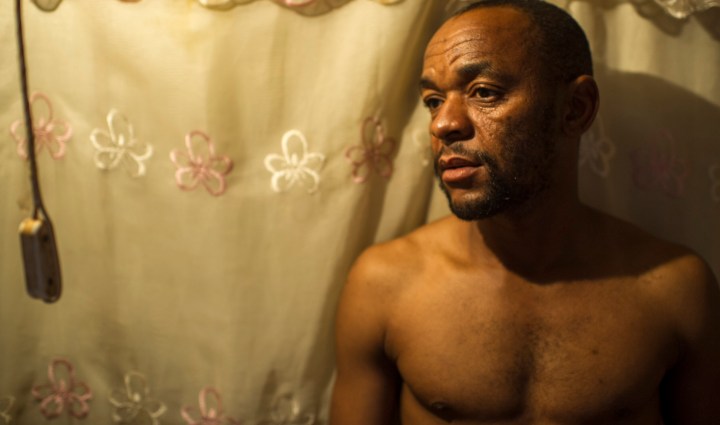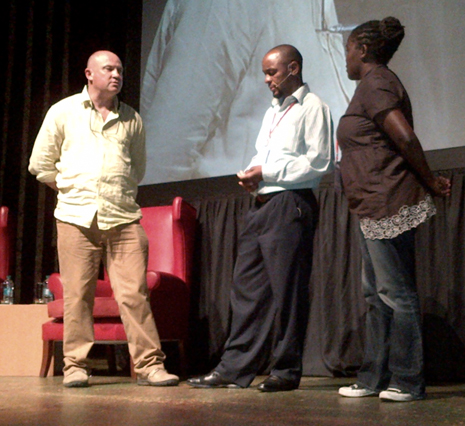South Africa
The Passion of Bhele, a simple mineworker, a broken man

Every day, a little more of the horror of Marikana surfaces. Yet every day we are able to set aside what we read and see unfolding at the Farlam Commission and go on with our lives. For those of us who were at The Gathering 2.0 last Friday, that might no longer be possible. “Bhele” Tholakele Dlunga, a Lonmin rock drill operator, brought his terror, trauma, heartbreak, disappointment and fear to us. And now the questions he is grappling with are our questions too. By RANJENI MUNUSAMY.
I did not go to Marikana after the 16 August massacre. I could not. The political violence in KwaZulu-Natal throughout the 90s damaged me in so many ways that there was a time I no longer feared the sound of automatic gunfire nor was repulsed by the smell of blood or burning human flesh. I went where the story was, and much too often, the story of KwaZulu-Natal was of brutality and mass killings.
From when I was a cub reporter, the killing fields were my place of work. In 1994, the year the world celebrated our attainment of freedom and democracy, 1,600 deaths were recorded in political violence KwaZulu-Natal. The following year the figure was 837 in 891 incidents. The number of bodies was reduced over time but the brutality was not. After each massacre, it was our responsibility to make sure that the story was not the body count, but about why the victims were killed and the fear and devastation in the wake of the murders.
Over time, the memory of the horror fades, but every now and then something triggers a flashback. A woman shrieking in the midst of revelry at a party can sound very much like the blood-curling screams of a woman holding her husband’s butchered body in her arms; the face of a little boy in supermarket can resemble that of a tiny corpse lying in the sand with a gunshot wound to his head; and township boys making a din on their way from soccer practice can spark the memory of a charging mob determined to get revenge for the murder of one of their own.
And so I did not go to Marikana after the police murdered 34 mineworkers, because I could not return to that place in my mind. When my colleague Sipho Hlongwane first went there, my advice to him was to avoid looking into the eyes of the children. I know from experience that through their fear and confusion, the eyes of the children can tell stories that can never be explained in words and cannot be easily forgotten. For whatever reason, Sipho did not listen to me. I can tell.
Greg Marinovich, through his experience in conflict zones around the world, was able to unearth the full and horrifying truth of what happened at Marikana, on the day of the massacre and in the weeks that followed. He also brought us the story of “Bhele” Tholakele Dlunga.
Dlunga is a rock drill operator at Lonmin’s Karee 4 Belt and became one of the worker leaders during the wildcat strike in August, when the miners rejected their union representatives. He was there on the mountain for all those days as the strike worsened, and he was there when police fired live ammunition at the miners, killing many of his fellow workers. He was one of the lucky ones who survived the massacre.
But last month, he suffered a second trauma, again at the hands of the police.
As Greg told us in his story of police intimidation and torture at Marikana, five plain-clothes policemen broke down Dlunga’s door and stormed into his one-roomed shack in Wonderkop village at Marikana at 5:30am on 25 October. They assaulted him and used a black plastic bag they found in his shack to cover his head and suffocate him while they beat him. They took him to Phokeng police station, where the assault continued. He was then transferred to another police station, where he was again tortured.
At The Gathering last week, his story came alive before us. Dlunga – or Bhele as he is known – relayed the sheer horror of his experiences in a way the best journalism cannot: his voice, his face, expressions of which woke up the nightmares I almost thought I had forgotten.
The full impact of what he was saying could not be communicated through the translator (he spoke in isiXhosa), but it was perhaps his demeanour that was most disturbing. He stood on the stage, unsure, nervous and broken, wringing his hands as he tried to get the right words out that could convey his humiliation and terror.

Photo: Bhele Dlunga on The Gathering 2.0 stage with Greg Marinovich and the translator, Busisiwe Mdlalose.
Nothing the Farlam Commission of Inquiry can come up with can undo Bhele’s pain or make up for the torture he suffered. It infuriates him that despite his dignity and human rights being violated, the policemen face absolutely no consequences for their reprehensible behaviour. Like many in that community, he does not understand the processes of the commission of inquiry and does not trust that it will get to the truth.
It was Bhele’s responses to questions about how he feels now about the massacre and the torture that tore open his pain and anger. He said he hated the government and the police for what they did to him and his people.
“We will not vote for the ANC because the ANC killed our people. We are not sure that we will even vote.”
He said if their employer, Lonmin, had only talked to the workers during the strike, all that happened could have been avoided. Asked who he blamed most for what happened at Marikana, Lonmin or the government, Bhele responded: “They are the same”.
The responses to Bhele’s story have been varied. Many of us are haunted by it. A few people felt that he was not an innocent victim but someone who was involved in perpetrating violence against others in the run-up to the massacre. Others felt that his was just one side of an extremely complex story with multiple failures by all the parties involved.
There is merit in all these arguments. But no citizen of our country should be that demeaned to the extent where they see themselves as lesser humans – particularly not by those charged with protecting our democracy. Nothing Bhele could have done in trying to secure higher wages for himself and his fellow workers could warrant the cruelty he suffered at the hands of the police. If the police thought he was involved in the murders of their colleagues and security guards before the massacre, he should have been charged and put on trial, not subjected to extrajudicial punishment.
Bhele – as a mineworker, living in a shack and getting by on meagre means, and who suffered the life-defining experiences of a dreadful massacre and torture – leads a difficult life, the struggles of which are now underlined by further tragedy. He has lost faith in our democracy and our country. And he has lost hope.
I have no idea how Bhele’s life will turn out after this, and if he might someday find justice for his suffering. On Friday I wanted desperately to tell him how sorry I was for his pain and trauma, and apologise on behalf of the party and government I voted for. I didn’t, because I know the party and government I voted for is not sorry for what they did to Bhele and hundreds of his friends and co-workers.
I do not want Bhele to fade into the depths of my memory like all the other ghosts which linger there. Their suffering occurred at a different place and a different time in our history. Bhele’s happened at the height of our democracy, where evil is trying to usurp the freedoms we fought for.
I do not want to lose faith in our democracy. And I do not want to lose hope. The next time I vote, I will remember Bhele. DM
Main photo: “Bhele” Tholakele Dlunga (Greg Marinovich)


















 Become an Insider
Become an Insider